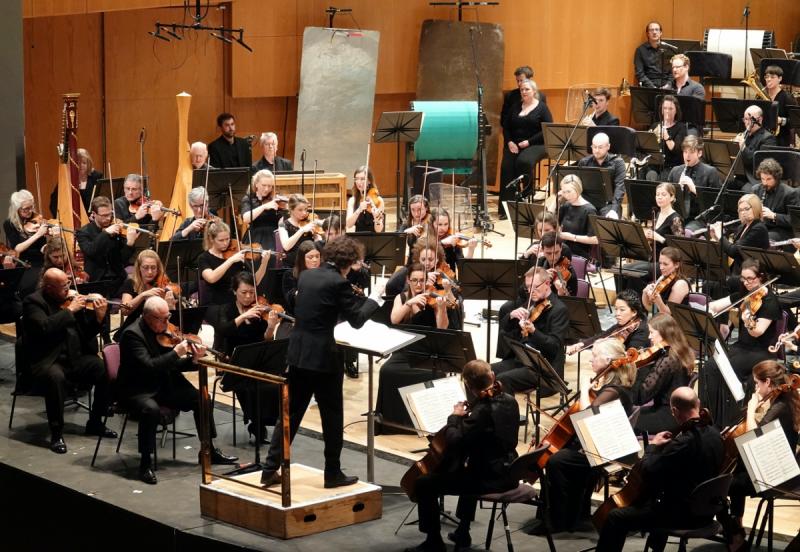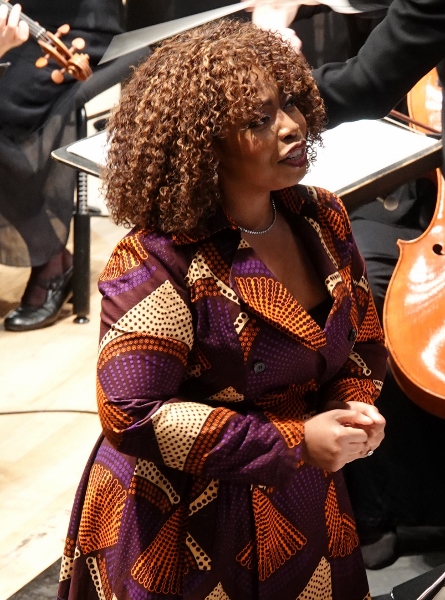Chiejina, BBC Philharmonic, Collon, Bridgewater Hall, Manchester review - something scenic, and something else | reviews, news & interviews
Chiejina, BBC Philharmonic, Collon, Bridgewater Hall, Manchester review - something scenic, and something else
Chiejina, BBC Philharmonic, Collon, Bridgewater Hall, Manchester review - something scenic, and something else
High romantic and vivid orchestral sounds contrast with Coult world premiere

An evening of “scenic orchestral works”, according to the programme booklet, was on offer from the BBC Philharmonic on Saturday. Scenic was certainly true of the Seven Early Songs of Alban Berg and Richard Strauss’s Alpine Symphony. But Tom Coult’s Three Pieces That Disappear was something else.
The high romantic word setting and vivid orchestral picture painting of Berg and Strauss are in familiar aesthetic modes: the music (and the words of nature poetry, in the Berg) animate your imagination, and something visual may well pop into your head, aided of course by the composer’s own descriptive notes in the Strauss. Tom Coult, in the work that had its world premiere in this concert conducted by Nicholas Collon, is thinking of things of the mind that are far from obvious: evanescent and maybe even lost.
He can do descriptive music, as we know very well from his last big composition for the Philharmonic, Pleasure Garden (2021): rain falling, birds singing and so on. But this new one was a product of the Covid era, and (as he says) is about music being “remembered, forgotten, misremembered, imagined or deteriorating”.
There are three movements, and each seems to come unstuck in one way or another – intentionally. In the first, beginning with a set of rather sorrowful fanfares and continuing with big gestures and repeated sighing motifs, progress intermittently just stopped. The second was more a matter of quietude interrupted (to do with “musical worlds that signify childhood”, though I wouldn’t have guessed that unless he’d told us); the third featured dismembered brass chorale-like lines, sometimes sliding off-note, and by the end there was a fade-out in Farewell Symphony style, as Philharmonic leader Yuri Torchinsky was left playing the last notes on his own. Repeatedly the idea of an almost chaconne-like falling sequence was employed, as if the music were trying to grasp at something familiar but fleeting, each time it was heard.
As a testament of a time we are all now only too eager to move on from, and perhaps pretend never happened, it captures something of an experience like no other in most of our lives. Whether the Philharmonic were completely at home with it, I’m not entirely sure. I haven’t seen the score so don’t know exactly what it asked for: the slightly non-synchronised pizzicati were either something very clever indeed… or perhaps not?
 Berg, in his pre-serial mode, was more like mainstream territory, and Francesca Chiejina sang the Seven Early Songs beautifully. When he orchestrated the accompaniments for them in 1928, Berg used a conventional large orchestra, and with around 40 strings forming its foundation Chiejina (pictured left) had a full sound to contend with. Balance will probably sound better when the concert is broadcast than it did in the hall, since though her big high notes were easily heard atop the orchestral textures it was difficult for her elsewhere to avoid being swallowed up in all that richness, especially when the words of the poetry call for faintness and soft, fairytale sound. Of course the effect of post-Wagnerian chromaticism in full orchestral garb is a wonderful thing – and Collon and the Philharmonic made it so – but it began to seem that the voice was just one strand among many in the tapestry. Maybe it was meant to be… maybe not.
Berg, in his pre-serial mode, was more like mainstream territory, and Francesca Chiejina sang the Seven Early Songs beautifully. When he orchestrated the accompaniments for them in 1928, Berg used a conventional large orchestra, and with around 40 strings forming its foundation Chiejina (pictured left) had a full sound to contend with. Balance will probably sound better when the concert is broadcast than it did in the hall, since though her big high notes were easily heard atop the orchestral textures it was difficult for her elsewhere to avoid being swallowed up in all that richness, especially when the words of the poetry call for faintness and soft, fairytale sound. Of course the effect of post-Wagnerian chromaticism in full orchestral garb is a wonderful thing – and Collon and the Philharmonic made it so – but it began to seem that the voice was just one strand among many in the tapestry. Maybe it was meant to be… maybe not.
The Alpine Symphony’s orchestra size revealed why the Bridgewater Hall stage extension, created for distancing purposes in Covid times, had been brought back into use. Strauss’s music got around 60 strings, which, added to quadruple woodwind, nine horns, two tubas, two timpani, two harps, two thunder sheets, three wind machines and a full kitchen department including the cowbells, needed a lot of space. The cowbells, incidentally (in the score to add credibility to the picture of mountain pastures at the point where Strauss’s musical account of a day’s hill walking depicts it), were quite hard to hear – partly because orchestras always seem to go for those in a middle pitch range, whereas real farmers in the Alps prefer them to tinkle while the bigger, lower ones are sold to tourists, and partly because Collon and his forces wanted us to hear everything else going on at the same time – and there was a lot going on.
It was spectacular, from the moment of the sunrise onwards, and Collon, a conductor who is economical in gesture but always clear about his intentions, paced the whole vast tone poem with skill and controlled the climaxes carefully so that the biggest and most overwhelming sound of all was reserved for the mountain-top experience – approached with breathless awe and a beautiful oboe solo by Jennifer Galloway. The storm scene came a close second, with the Bridgewater Hall organ contributing its pedal stops’ throbbing underpinning.
At the conclusion of this marathon in sound it takes a lot to tune the wind instruments perfectly to the unvarying purity of the organ’s softer stops, but the Philharmonic’s players managed that – almost – to perfection.
- To be broadcast on Radio 3 on 11 April
- More classical reviews on theartsdesk
rating
Share this article
Add comment
The future of Arts Journalism
You can stop theartsdesk.com closing!
We urgently need financing to survive. Our fundraising drive has thus far raised £49,000 but we need to reach £100,000 or we will be forced to close. Please contribute here: https://gofund.me/c3f6033d
And if you can forward this information to anyone who might assist, we’d be grateful.

Subscribe to theartsdesk.com
Thank you for continuing to read our work on theartsdesk.com. For unlimited access to every article in its entirety, including our archive of more than 15,000 pieces, we're asking for £5 per month or £40 per year. We feel it's a very good deal, and hope you do too.
To take a subscription now simply click here.
And if you're looking for that extra gift for a friend or family member, why not treat them to a theartsdesk.com gift subscription?
more Classical music
 Hallé John Adams festival, Bridgewater Hall / RNCM, Manchester review - standing ovations for today's music
From 1980 to 2025 with the West Coast’s pied piper and his eager following
Hallé John Adams festival, Bridgewater Hall / RNCM, Manchester review - standing ovations for today's music
From 1980 to 2025 with the West Coast’s pied piper and his eager following
 Kaploukhii, Greenwich Chamber Orchestra, Cutts, St James's Piccadilly review - promising young pianist
A robust and assertive Beethoven concerto suggests a player to follow
Kaploukhii, Greenwich Chamber Orchestra, Cutts, St James's Piccadilly review - promising young pianist
A robust and assertive Beethoven concerto suggests a player to follow
 Robin Holloway: Music's Odyssey review - lessons in composition
Broad and idiosyncratic survey of classical music is insightful but slightly indigestible
Robin Holloway: Music's Odyssey review - lessons in composition
Broad and idiosyncratic survey of classical music is insightful but slightly indigestible
 Classical CDs: Wolf-pelts, clowns and social realism
British ballet scores, 19th century cello works and contemporary piano etudes
Classical CDs: Wolf-pelts, clowns and social realism
British ballet scores, 19th century cello works and contemporary piano etudes
 Bizet in 150th anniversary year: rich and rare French offerings from Palazzetto Bru Zane
Specialists in French romantic music unveil a treasure trove both live and on disc
Bizet in 150th anniversary year: rich and rare French offerings from Palazzetto Bru Zane
Specialists in French romantic music unveil a treasure trove both live and on disc
 Scottish Chamber Orchestra, Ibragimova, Queen’s Hall, Edinburgh review - rarities, novelties and drumrolls
A pity the SCO didn't pick a better showcase for a shining guest artist
Scottish Chamber Orchestra, Ibragimova, Queen’s Hall, Edinburgh review - rarities, novelties and drumrolls
A pity the SCO didn't pick a better showcase for a shining guest artist
 Kilsby, Parkes, Sinfonia of London, Wilson, Barbican review - string things zing and sing in expert hands
British masterpieces for strings plus other-worldly tenor and horn - and a muscular rarity
Kilsby, Parkes, Sinfonia of London, Wilson, Barbican review - string things zing and sing in expert hands
British masterpieces for strings plus other-worldly tenor and horn - and a muscular rarity
 From Historical to Hip-Hop, Classically Black Music Festival, Kings Place review - a cluster of impressive stars for the future
From quasi-Mozartian elegance to the gritty humour of a kitchen inspection
From Historical to Hip-Hop, Classically Black Music Festival, Kings Place review - a cluster of impressive stars for the future
From quasi-Mozartian elegance to the gritty humour of a kitchen inspection
 Shibe, LSO, Adès, Barbican review - gaudy and glorious new music alongside serene Sibelius
Adès’s passion makes persuasive case for the music he loves, both new and old
Shibe, LSO, Adès, Barbican review - gaudy and glorious new music alongside serene Sibelius
Adès’s passion makes persuasive case for the music he loves, both new and old
 Anja Mittermüller, Richard Fu, Wigmore Hall review - a glorious hall debut
The Austrian mezzo shines - at the age of 22
Anja Mittermüller, Richard Fu, Wigmore Hall review - a glorious hall debut
The Austrian mezzo shines - at the age of 22
 First Person: clarinettist Oliver Pashley on the new horizons of The Hermes Experiment's latest album
Compositions by members of this unusual quartet feature for the first time
First Person: clarinettist Oliver Pashley on the new horizons of The Hermes Experiment's latest album
Compositions by members of this unusual quartet feature for the first time

Comments
Why would you review this
Thank you for making this
Thank you for making this point, David, which I would certainly agree with in spirit.